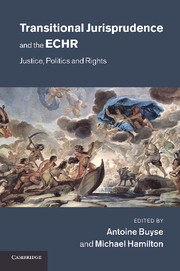Book contents
- Frontmatter
- Contents
- Foreword
- Acknowledgements
- 1 Introduction
- 2 Transitional emergency jurisprudence
- 3 Rights and victims, martyrs and memories
- 4 Confronting the consequences of authoritarianism and conflict
- 5 Freedom of religion and democratic transition
- 6 The truth, the past and the present
- 7 Transition, political loyalties and the order of the state
- 8 Transition, equality and non-discrimination
- 9 Closing the door on restitution
- 10 The Inter-American human rights system and transitional processes
- 11 The ???transitional??? jurisprudence of the African Commission on Human and Peoples??? Rights
- 12 Conclusions
- Index
- References
9 - Closing the door on restitution
the European Court of Human Rights
Published online by Cambridge University Press: 07 September 2011
- Frontmatter
- Contents
- Foreword
- Acknowledgements
- 1 Introduction
- 2 Transitional emergency jurisprudence
- 3 Rights and victims, martyrs and memories
- 4 Confronting the consequences of authoritarianism and conflict
- 5 Freedom of religion and democratic transition
- 6 The truth, the past and the present
- 7 Transition, political loyalties and the order of the state
- 8 Transition, equality and non-discrimination
- 9 Closing the door on restitution
- 10 The Inter-American human rights system and transitional processes
- 11 The ???transitional??? jurisprudence of the African Commission on Human and Peoples??? Rights
- 12 Conclusions
- Index
- References
Summary
Introduction
Emergence from authoritarian rule is often accompanied by sweeping changes in systems of governance. New institutional structures are put in place to ensure that the rule of law and the protection of human rights acquire a firm foundation. It is the memory of the past that inspires the creation of these new structures, but do they provide closure? Should they provide a continuing forum for individuals to come to terms with the past? Put simply, can a new institutional order secure the rule of law and human rights without giving a voice to individual stories of past injustice?
This chapter focuses on how the European Court of Human Rights deals with these issues in connection with claims for the restitution of property. The focus is on the former communist states that have denied restitution to at least some former owners. In such cases, the state denies that there is any need to correct past injustices by providing individual remedies. The state may argue, of course, that the new regime provides justice for all, and hence everyone is so much better off that no single individual has a cause to demand a remedy for historic injustice. In practice, however, expectations of justice are not always satisfied in this way, and many individuals turn to the Court for a remedy
- Type
- Chapter
- Information
- Transitional Jurisprudence and the ECHRJustice, Politics and Rights, pp. 208 - 238Publisher: Cambridge University PressPrint publication year: 2011
References
- 2
- Cited by



